|
Why Mirror
Image Treatment, Exercise and Even Plain Old Manipulation Fail
When They Fail
One Set of
Films That
Demonstrates the Problem:
Lack of
analysis in THREE dimensions replaced by talk of "global"
treatment with no understanding of what is occurring in the
spinal column.
One of the
first and worst misunderstandings is that you can release or
breakup meningeal adhesions by light pressure is sounds nice
and practitioners fall for it but it just does not happen.
That is like saying you can separate scars on your skin by
light pressure -- is just does not physically happen.
Below are
two sets of full spine standing and sitting AP and Lateral
films of the same person 5 months apart. I advise you to
double click on them to get higher resolution pictures and
then to print them out, use 8
½" by 14" (legal)
sized paper if you have it. Then compare them while
following the explanation below.
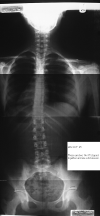
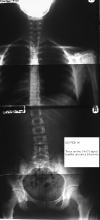
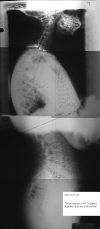
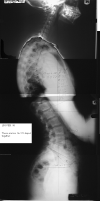
LB2 Standing AP LB3 Standing AP LB2
Standing Lat. LB3 Standing Lat.
Oct. 1995 Feb
1996
Oct. 1995
Feb 1996

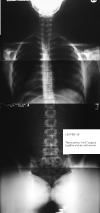
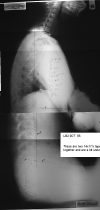
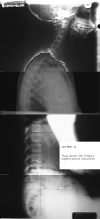
LB2 Sitting AP
LB3 Sitting AP LB2 Sitting Lat.
LB3 Sitting Lat.
Oct. 1995 Feb
1996
Oct. 1995
Feb 1996
The first thing to note is that
this is not a full analysis of the films but just a few points
no one else seems to get or even every view because no one
dares to bother looking at sitting and standing full spines,
none-the-less look at them through the eyes of an engineer
doing a structural analysis having no preconceptions about
what should be.
All the films were taken with the
instructions, "Breathe in, breathe out and let your body relax
and slump. We are looking at where the skeleton holds the
person upright with bone leverage. We are NOT looking at them
holding themselves upright with muscle power.
The treatment was standard
Advanced Biostructural Correction™
with nothing special done. That means the meninges were
released and then the bones out of place that the body could
not self-correct because there are no muscles pulling in the
direction needed were correctly positioned. (The present
tense at the end of that statement is correct.)
This patient was uncooperative in treatment schedule but is
still Unwinding and progressing adequately though not at the
rate of those sticking to the treatment plan. There are
further follow-up films and complete analysis in the
Advanced Biostructural Correction™
X-ray Seminar on CD (which includes 40 full spine standing and
sitting films and analysis of several cases).
I hope you have
printed these out as they are difficult to view on the screen
unless you have a very large one. First, put the Standing LB2
and LB3 APs side by side and the sitting LB2 and LB3 APs side
by side.
For full analysis you must visualize and
measure as in THREE dimensions but we are just looking at a
small piece of the analysis here.
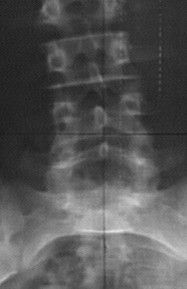
Note the lumbar spine in LB2
Standing:
There is a thoracolumbar scoliosis to the left viewed on the
films. However, note that L5 and L4 do not quite look as
smoothly curved left as the other vertebrae.
Now note the LB2
SITTING AP view: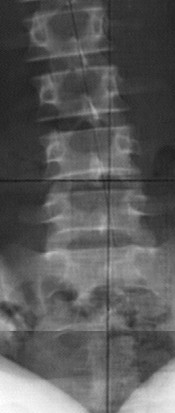
There is also a thoracolumbar scoliosis to the left here but
it is farther to the left and L5 and L4 are still not smoothly
in the leftward curve. (This change in curve and shape
of curve is consistent with, and correlates with, the
Breakdown of the lumbar lordosis seen on the sitting lateral,
but that is for the greater analysis in the full seminar.)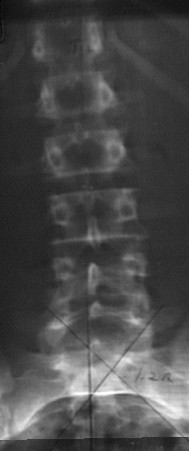
Going to the LB3
view FIVE months later:
We see here that the thoracolumbar scoliosis we thought we saw
to the left in the earlier pictures (LB2 standing and sitting)
was actually an S shaped scoliosis with the lower lumbars
going right, then left starting at L4-L3 and then coming back
to the right in the thoracic spine.
Going to the Sitting AP LB2 and LB3 you now might notice the S
configuration in the LB2 sitting (the section above on left) because you know what to look
at. You can see that same S shape in the thoracolumbar curve
in the LB3 picture but the spine is in much better mechanical
condition overall so some of that mechanical stress is shifted
to the AP direction. Remember I noted that the spine moves and
twists in THREE dimensions??
So, looking at the LB2 sitting Lateral compared to the LB3
sitting Lateral You find that there was a collapse of the
upper thoracic curve in the LB2 films (all of them). You can
note that collapse by the reversal of the kyphosis in the
thoracic spine from T12 (T12 angle is negative 4 degrees) up
through T8 or T7 and the flat spot T5-4-3-2-1. However, in LB3
you can note much less of a reversal in the lower and
midthoracic spine and that the upper thoracic curve in the LB3
film now has a semblance or normalcy.
What you are watching there is the return of the correct
curves in the spine in THREE dimensions and not just a spine
forced into a set of tighter curves that are actually more
pathological.
A hint at what to look at further in these films, it looks
like there is a thoracic kyphosis in the standing lateral LB2,
however, you know from the sitting that the thoracic spine
there is actually just collapsed. Can you see that? Much more
there. What about the lumbars? What in the lumbar lateral
would point you to the fact that there was a curve to the
right that was hidden as the body leaned far to the left and
compressed it down to just about total invisibility? How
about treatment? See below.
Woops. What if you treated with exercise and bracing and/or
mirror image structural care, manipulation etc.? What did you
do and what do you see?
It varies because bodies compensate differently and different
configurations of pathological mechanics exist in the pelvis,
legs and upper spine. However, it often goes something like
this: Either more curve to the left because the body is pushed
right, which is actually INTO its problem side. Or,
straighter spine but with many kinks like the ones you see at
L4-L5 on the LB2 standing film.
If More Curve:
The body, being pushed into its Breakdown direction (the direction
in which its mechanics are Breaking Down [as in a mechanical
breakdown in a car]), The body, being pushed into its
Breakdown direction curves further left to compensate even
harder and prevent a worsened condition. (Now comes the
operation for many.)
If Less Curve but More Kinks:
The body, being pushed into its Breakdown side and unable to curve
more to the left for one of several possible reasons, was
forced to twist to compensate. That results in a more twisted
condition which, seems to look better but leads to other
mechanical pathologies and worsening inability to move freely.
Leave this last one alone for a while and they will either
deteriorate and have other mechanical problems within a few
years, or they will revert to the curved condition but not
quite the same.
As noted,
these configuration changes correlate with the changes in the
lumbar curves seen on the Lateral films and even with the
changes you see form sitting to standing. I leave you to view
those and try to workout an understanding. Alternatively, you
can buy the
Advanced Biostructural Correction™
X-Ray Seminar on CD by calling 203 366-2746. Ask for Alison.
Back to
Home page On to
|











